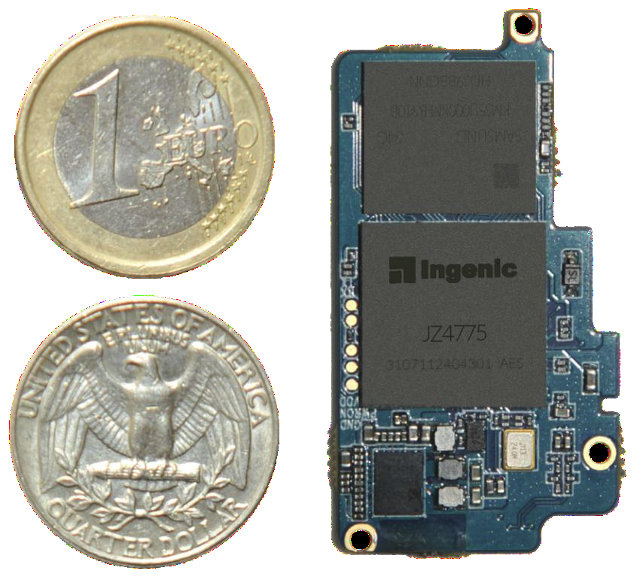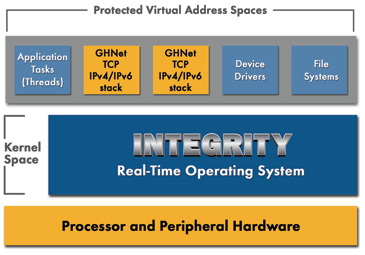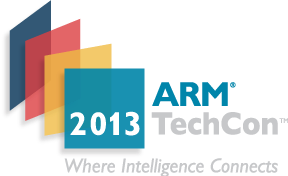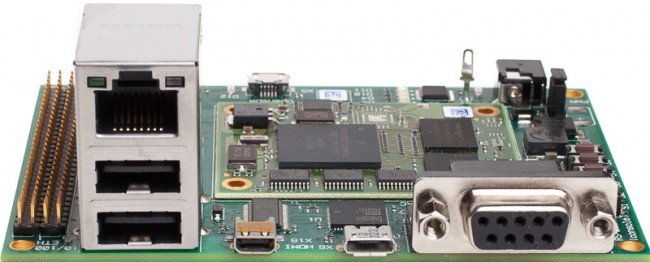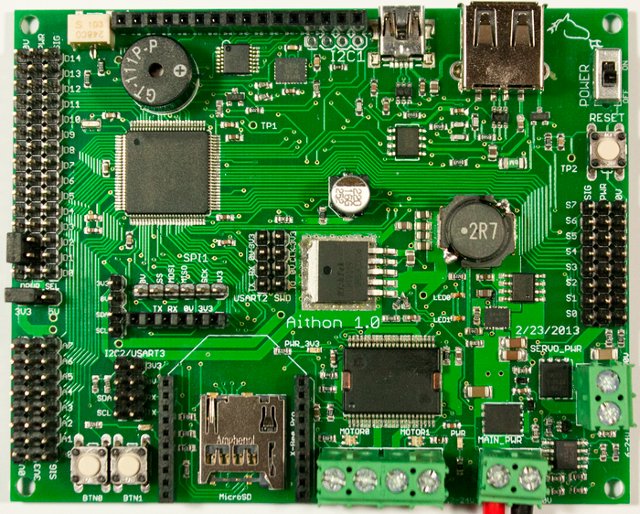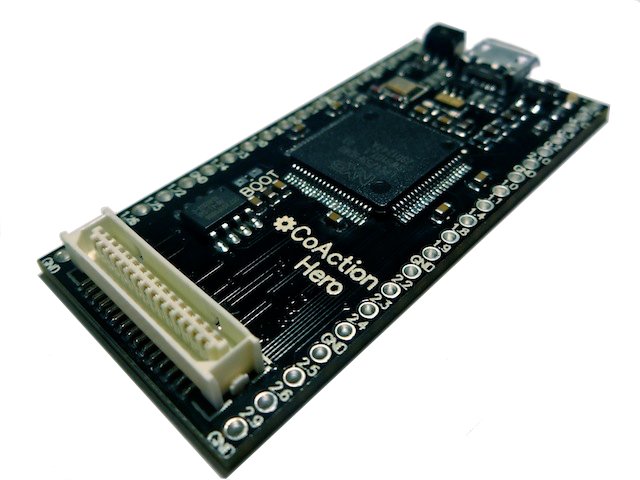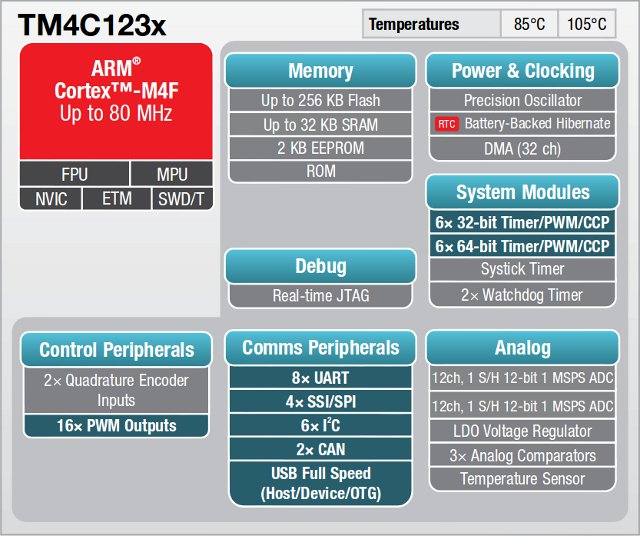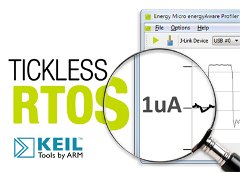Imagination Technologies has published a blog post about Newton, a tiny reference design for wearables based on Ingenic JZ4775 MIPS SoC found in some recent smartwatches such as SmartQ Z1 (The CPU not the module). This module targets wearables, IoT, healthcare, home appliances, security, industrial control, consumer electronics and more. Newton Specifications: SoC – Ingenic JZ4775 MIPS Xburst processor @ 1 GHz with 2D GPU, and VPU supporting 720p@30fps for MPEG-2, MPEG-4, VC-1, H.264, VP8, and RV9 codecs. System Memory – Up to 3GB mobile DDR3/DDR2/LPDDR1 Storage – Up to 32 GB eMCP eMMC flash Display Support – LCD or EPD, with touch panel and backlight Audio – Digital MIC and Speaker Connectivity – 4-in-1 combo with Wi-Fi (802.11 a/b/g/n at 2.4/5 GHz), Bluetooth 4.0 + EDR (including Bluetooth LE support), NFC, and FM Sensors – 3-axis gyroscope, accelerometer magnetometer, pressure, humidity and temperature, bio-signal detection and processing USB – USB […]
Green Hills Software Announces ARM Cortex A50 Support for INTEGRITY RTOS and Development Tools
The latest SoCs based on 64-bit ARM Cortex A53 and A57 are not only going to be used in servers and high-end mobile devices, and some embedded applications in automotive, industrial, Mil/Aero sector, as well as the Internet of Things (IoT) will also leverage the low power, high performance of ARMv8 processors. Green Hills Software has announced their INTEGRITY real-time operating system (RTOS) and MULTI integrated development environment (IDE) will support SoCs based on ARM Cortex A50 series cores. Green Hills provide the following solutions on ARMv8 Fast Model virtual platform: INTEGRITY RTOS which comes with functional safety certifications in industrial, medical, automotive and railway, and delivers real-time determinism Green Hills C/C++ Optimizing Compilers/assembler and 64-bit toolchain MULTI 64-bit IDE debugger, MISRA C/C++ code quality adherence, profiler and other integrated tools. Only ARMv8-A is supported for now, but not ARMv8-R, destined to be used in safety-related applications in automotive and […]
ARM TechCon 2013 Schedule – ARM Servers, Internet of Things, Multicore, Hardware and Software Optimization and More
ARM Technology Conference (TechCon) 2013 will take place on October 29 – 31, 2013, in Santa Clara, and the detailed schedule for the event has just been made available. In the previous years, the conference was divided into Chip Designs day (1 day), and the other 2 days were reserved for Software & System Design, but this year it does not appear to be the case. Whether you’ll be able to attend the event or not, it’s worth having a look at what will be discussed there in order to have a better understanding of what will be the key ARM developments in the near future in terms of hardware and software. There will be around 90 sessions categorized into 15 tracks: Accelerating Hardware Development – This track explores the resources, tools, and techniques that designers can employ to quickly bring hardware to market. Topics include multicore design, ARM IP, […]
$55 Phytec Cosmic Boards Feature Freescale Vybrid SoCs
Freescale Vybrid SoC family has been announced at the beginning of last year, with the low-end VF3xx and mid-end VF4xx featuring a single Cortex A5 CPU, and the higher-end VF6xx and VF7xx providing a multi-core processor with Cortex A5 and Cortex M4 cores, for respectively performance, and real-time/low power tasks. Phytec has just announced the Cosmic board featuring Freescale Vybrid VF6xx single core Cortex A5 processor, and Cosmic+ board with Vybrid VF6xx Cortex A5 + Cortex M4 processor. Both boards are comprised of a baseboard coupled with a Phytec phyCORE-Vybrid system-on-module (SoM), and can be used for Linux and MQX (Freescale RTOS) development. Cosmic / Cosmic+ boards specifications: Processor VF5xx ARM Cortex-A5 @ 500MHz (Cosmic) VF6xx ARM Cortex-A5 @ 500MHz + ARM Cortex-M4 @ 167 MHz (Cosmic+) System Memory – 512 MB DDR3 Storage – 512 MB NAND + micro SD slot USB – HS USB OTG / HS USB […]
Aithon Motor Control Board Runs Chibios/RT RTOS
The Aithon board is a board powered by an STM32 Cortex M4 MCU destined at controlling motors and robotics applications. The board runs Chibios/RT, an open source RTOS, and a set of libraries are also provided to make programming the 2-channel motor driver, and other peripherals/sensors easier. Here are the specifications of the board: MCU – STMicroelectronics STM32F407 ARM Cortex-M4 @ 168 MHz, FPU, 512KB flash and 192KB RAM, up to 17 timers, an RTC, and 12-bit ADC I/O (All digital I/Os are 5V tolerant): 15 GPIO 8 ADC inputs and 8 PWM servo outputs Up to 3 USART (one shared with 1 I2C port + XBee) Up to 4 I2C (split between two independent buses) 1 SPI header 1 SWD header 1 12-bit DAC output (shared with SPI SCLK) USB – mini-USB (device) and standard USB (host) ports Expansion Headers: XBee socket Bluetooth header for optional Roving Networks RN42 […]
CoAction Hero – Low Cost ARM Cortex-M3 Board Running Open Source CoActionOS RTOS
CoAction Hero is a tiny board based on an ARM Cortex-M3 micro-controller (NXP LPC1759), that makes use of CoActionOS ecosystem that includes the hardware, but also an open source RTOS allowing multiple app to run concurrently, and a graphical interface to communicate with the board. First, let’s have a look at the hardware specs: Micro-controller – NXP LPC1759 ARM Cortex-M3 processor @ 120MHz with 64kB RAM and 512kB Flash ROM. Storage – 1MB serial flash chip (pre-loaded with CoActionOS) Expansion port micro USB connector. 40 I/O pins are available on both sides of the board, and the board can be inserted in a breadboard. You can currently connect 2 modules to the board: Bluetooth and LCD device boards. CoActionOS RTOS will come pre-loaded on the board, and if you don’t want to, you don’t even need to know it’s there, and it’s use will be transparent. But let’s have a […]
Texas Instruments Announces Tiva Cortex M4 MCUs and $12.99 LaunchPad Evaluation Kit
Texas Instruments has just announced the Tiva ARM MCU platform, and specifically the Tiva C Series TM4C123x ARM Cortex-M4 MCUs, which are the first Cortex-M MCUs to be built on 65 nanometer flash process technology. The Tiva C Series TM4C123x MCUs, formerly known as Stellaris LM4F MCUs, are available now and target home, building and industrial automation. Key features and benefits of Tiva C Series MCUs: MCU Core – ARM Cortex-M4 floating-point core, operating at up to 80 MHz. Mixed-signal applications with high-performance analog integration – 2×12-bit ADC and 3 comparators.12-bit ADC accuracy is achievable at the full 1 MSPS rating without any hardware averaging. On-chip connectivity options – USB (host, device and On-The-Go), UARTs, I2C, SSI/SPI, CAN, etc.. Non-volatile storage of user interface or configuration parameters to reduce system cost – Thanks to integrated EEPROM. Low power – Standby currents as low as 1.6 uA. Large choice of MCU […]
Keil RTX RTOS is Now Available for Energy Micro EFM32 MCUs
Energy Micro has recently announced the availability of the Keil RTX real-time operating system (RTOS) as part of its Simplicity Studio tool suite. The Keil RTX has been optimized for ARM Cortex-M processors to provide flexible scheduling and high-speed operation, and has been improved to enable an ultra-low power, deep-sleep mode between tasks. Energy Micro has implemented a tickless mode in Keil RTX. This mode allows the EFM32 Cortex M3 MCUs to wake up only when needed, either at a scheduled time or on an interrupt event. This results in much lower power consumption in sleep mode compared to other SysTick implementations. The video below shows the difference between SYSTICK mode where the system consumes about 2.7mA in active mode, and 830 uA in sleep mode to the new tickless mode where the MCU still consume the same amount of energy in Active mode, but only 1uA in sleep mode, […]


